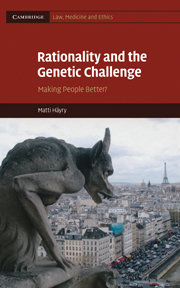Book contents
- Frontmatter
- Contents
- Preface
- 1 Seven ways of making people better
- 2 Rational approaches to the genetic challenge
- 3 The best babies and parental responsibility
- 4 Deaf embryos, morality, and the law
- 5 Saviour siblings and treating people as a means
- 6 Reproductive cloning and designing human beings
- 7 Embryonic stem cells, vulnerability, and sanctity
- 8 Gene therapies, hopes, and fears
- 9 Considerable life extension and the meaning of life
- 10 Taking the genetic challenge rationally
- Bibliography
- Index
Preface
Published online by Cambridge University Press: 05 July 2014
- Frontmatter
- Contents
- Preface
- 1 Seven ways of making people better
- 2 Rational approaches to the genetic challenge
- 3 The best babies and parental responsibility
- 4 Deaf embryos, morality, and the law
- 5 Saviour siblings and treating people as a means
- 6 Reproductive cloning and designing human beings
- 7 Embryonic stem cells, vulnerability, and sanctity
- 8 Gene therapies, hopes, and fears
- 9 Considerable life extension and the meaning of life
- 10 Taking the genetic challenge rationally
- Bibliography
- Index
Summary
Would you like your child to be healthy, strong, and clever? Would you like your child to be similar to you? If you have a seriously sick child, would you like to have another child who could provide a cure? Many parents have answered ‘Yes’ to these questions, and a growing number of scientists are trying to accommodate their wishes by perfecting technologies for prenatal selection.
What about yourself? Would you like to have a cure for ailments that threaten your life and health? Would you like to live longer? Would you like to live forever? Many people have answered ‘Yes’ to these questions, too, and an equally growing number of scientists are trying to accommodate their wishes by developing stem cell treatments, gene therapies, and other new remedies.
Other people, including many parents-to-be, have objected to these developments. Some have claimed that choosing your child is an uncaring thing to do, because children should be accepted as they are. Others have stated that it is wrong to use infants or embryos as medicine. And some have argued that genetic alterations will change human life beyond recognition.
This is a book about genetic selection and therapies and their impact on our lives. It is also a book about the moral and political concerns that parents, scientists, public decision makers, and academic ethicists have regarding attempts to make better future people and to make existing people better. But most of all, this is a book about bioethical rationalities – on distinct and self-contained ways of thinking about emerging technologies and their applications to medicine and healthcare.
- Type
- Chapter
- Information
- Rationality and the Genetic ChallengeMaking People Better?, pp. xi - xiiiPublisher: Cambridge University PressPrint publication year: 2010
- 1
- Cited by

